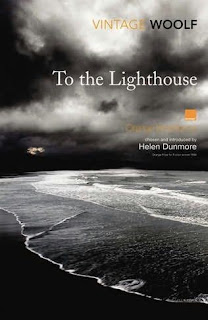Revisiting To the Lighthouse
As anyone who may look into this blog from time to time undoubtedly knows, Virginia Woolf wrote a number of modernist masterpieces. It's hard for me to choose from among her novels, to name the very finest, because each has its own merits, its own unique contributions to the literary world. But surely it would be impossible to consider modern literature without Mrs. Dalloway with its unfortunate light into Woolf's own life and demise. Equally, To the Lighthouse, is remarkable for its insights into how a family thrives and does not thrive, how two people relate and refuse to relate.
You really don't get much more pointed in such a discussion than this passage found on the very first page of the novel:
from To the Lighthouse
Virginia Woolf
"But," said his father, stopping in front of the drawing-room window, "it won't be fine."
Had there been an axe handy, a poker, or any weapon that would have gashed a hole in his father's breast and killed him, there and then, James would have seized it. Such were the extremes of emotion that Mr Ramsay excited in his children's breasts by his mere presence; standing, as now, lean as a knife, narrow as the blade of one, grinning sarcastically, not only with the pleasure of disillusioning his son and casting ridicule upon his wife, who was ten thousand times better in every way than he was (James thought), but also with some secret conceit at his own accuracy of judgement. What he said was true. It was always true. He was incapable of untruth; never tampered with a fact; never altered a disagreeable word to suit the pleasure or convenience of any mortal being, least of all his own children, who, sprung from his loins, should be aware from childhood that life is difficult; facts uncompromising; and the passage to that fabled land where our brightest hopes are extinguished, our frail barks founder in darkness (here Mr Ramsay would straighten his back and narrow his little blue eyes upon the horizon), one that needs, above all, courage, truth, and the power to endure.
Whereby Mr Ramsay is so generously agreeable in providing an image to place alongside any lexicographical exposition of the word "pompous." But apart from this severe portrait is the aplomb with which Virginia Woolf seems to move in and out of the consciousness of several different characters all within the same passage--a narrator, who looks uncompromisingly upon Mr Ramsay looking uncompromisingly, James, and Mr Ramsay himself. One is left with much the same impression that one has at the beginning of Mary Poppins when Mr. Banks treats us to the wisdom that "A British Nanny must be a general." So we have the Edwardian Father--committed to the truth for everyone except himself.
It is this depth of vision, this deep insight into what drives character and characters, that is one of the profound gifts Virginia Woolf has given us. She has given us the deep play of the psyche in the very ordinariness of life.

Woolf also taught us writers a thing or two about the variability of point of view and how to move the reader's attention from one detail to another within a scene. I confess that I've not yet read To the Lighthouse, but my whole conception of narrative changed when I read Mrs Dalloway. Virginia was certainly a brilliant writer.
ReplyDelete